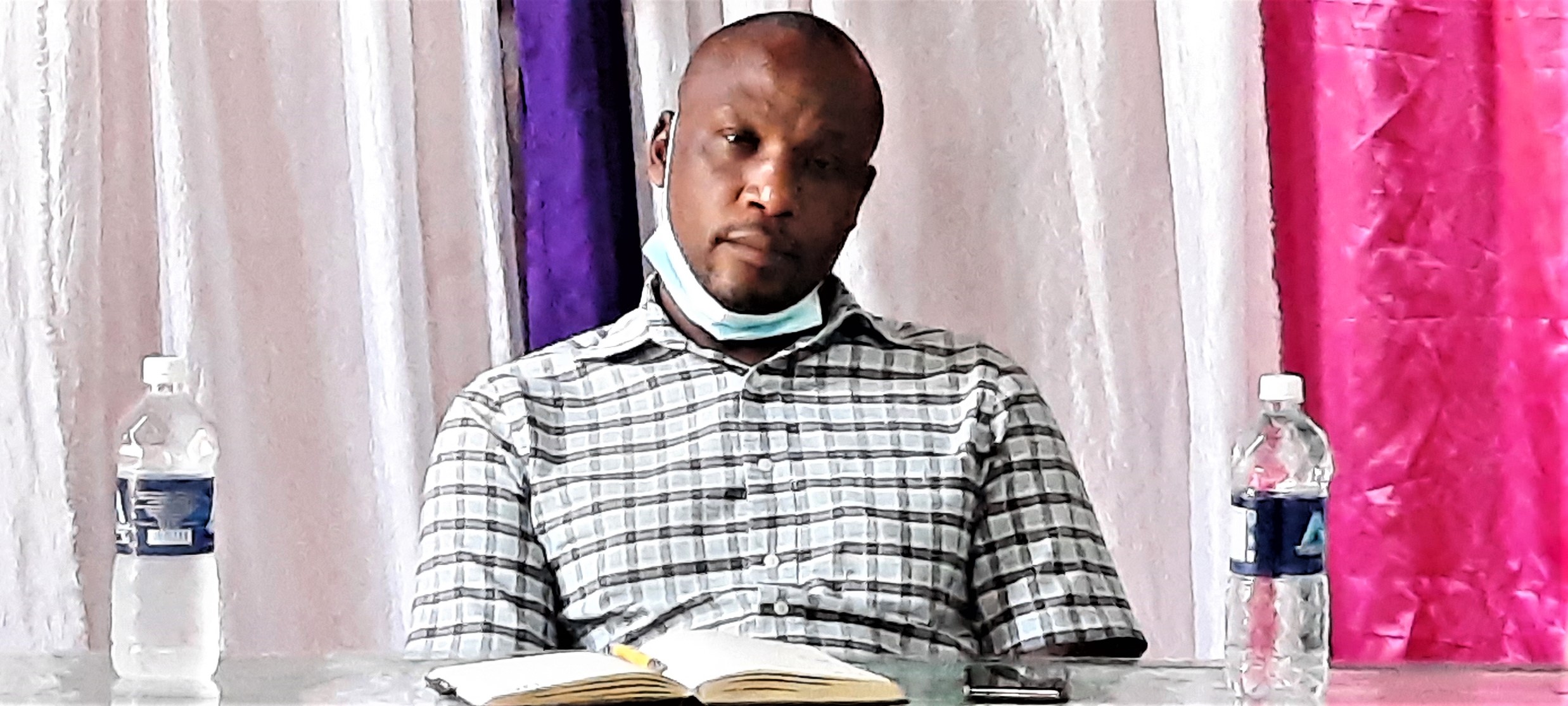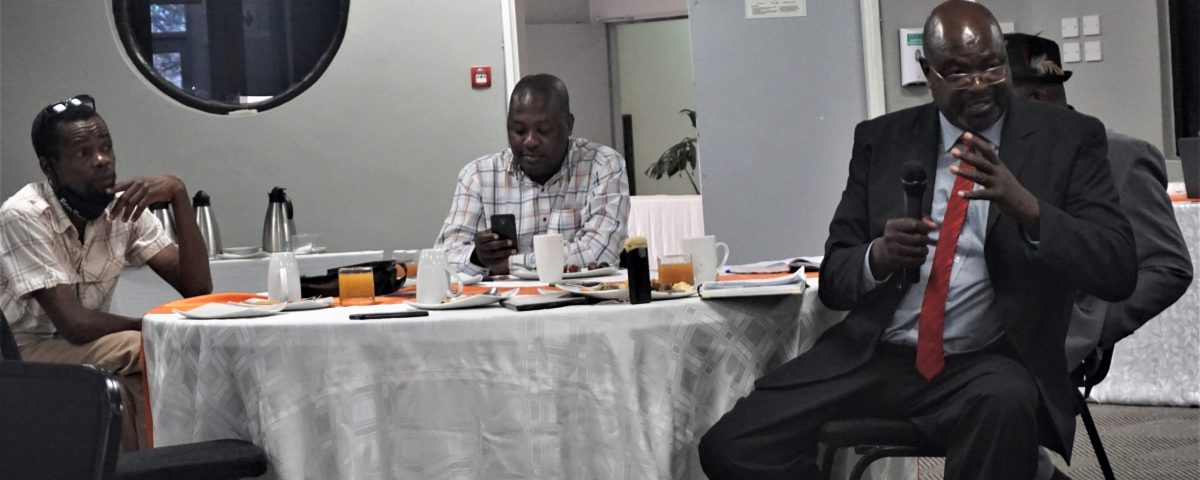
Chikanga suburb a Covid-19 hotspot again: City of Mutare
December 1, 2021
City of Mutare agrees it messed up as the Dangamvura Mountain quarry mine saga intensifies
December 8, 2021Zim Covid-19 experiences, the oversights, strengths deliberated

Mutasa South legislator Regai Tsunga (with microphone) sharing his experience on how he implemented constituency developmental programmes under covid-19 lockdown measures.
…As Omicron threats continue to raise alarm
Ngoni Dapira
ZIMBABWE needs a multi-stakeholder approach which is apolitical, knowledge based and pro-poor to effectively mitigate the global covid-19 pandemic, says stakeholders who attended a covid-19 stakeholders meeting held recently in Mutare.
This was said last week Tuesday during a Gender and Media Connect (GMC) media engagement breakfast meeting with stakeholders on bridging the information gap around covid-19 and vaccinations.

Hon Tsunga
Mutasa South legislator Regai Tsunga shared his experience on how they implemented constituency development work under strict covid-19 lockdown measures effected 30 March 2020. He commended Government for containing the first and second wave, but urged Government to hold a strategic planning review meeting to correct some grey areas where they overlooked certain things. He said this will help lessen covid-19 related deaths in the anticipated fourth wave which has already raised alarm as some experts are saying it might be lethal like the first and second wave.
“Covid-19 has really come at a cost in our country as we have lost people in droves and a good many of our people who were key personnel in community and breadwinners,” he said.
Honourable Tsunga castigated the selection criteria of the covid-19 task force at various levels of governance structures, from national, provincial and district levels.
“Fair enough the philosophy was to manage the covid-19 response through systematic and methodical interventions, but the downside is that the taskforces have sort of been militarized and it doesn’t give people the freedom to express themselves. In my view this must have been headed by civilians with the military assisting.”
Adding that the task forces were exclusionary of all stakeholders.
“There was some kind of politicization of these taskforces. For instance, Members of Parliament from opposition parties should have been included in the taskforce for inclusivity. Such a move for the citizens would have portrayed unity of purpose in combating the global pandemic. I have not participated in any taskforce activities but I represent a constituency as a duly elected Member of Parliament, but perhaps the fact that I represent the MDC, it means I am irrelevant. These are some of the things that we should look at as a country going forward so that we work together without politicizing institutions that are supposed to be serving our people.”
Hon Tsunga said the direct effect of exclusion and politicization of health issues was that information sharing systems on covid-19 became weak in constituencies overseen by legislators from opposition parties, citing that this also meant a low uptake on covid-19 related programmes due to polarized conceptions by the public based on political divide.
On law enforcement Hon Tsunga said enforcement has been good in terms of police doing operations to arrest people not wearing masks but said inconsistency and selective application of the law remains a problem that needs to be nipped in the bud.
The Mutasa South legislator applauded the ongoing weekly Cabinet decision matrix as a great initiative but questioned whether everyone has access to television and radio. He said urbanization of information with little thought of marginalized rural populations must be addressed, citing that the covid-19 pandemic has exposed the need for independent community radio stations in all provinces throughout the country for divergent views in terms of news content.
“There should now be a new way that the cabinet decision matrix is disseminated throughout the country for the benefit of all. Also the packaging of the messages in local languages noting that our Constitution of 2013 provides for 16 official languages. To what extent is this Cabinet decision matrix being translated to these 16 official languages? There is a gap there, actually it’s a huge gap. Let me call it a gulf rather than a gap in terms of our capacity to reach out and be inclusive of all on the messaging,” said Hon Tsunga.
On the current discussions being mooted globally of mandatory vaccinations, Hon Tsunga said although he is personally an advocate for covid-19 vaccination, the hints that Government might go for mandatory vaccination must be well consulted in view of the Constitutional rights that people have.

Itai Kariparire
Manicaland Informal Traders Association (MITA) president Itai Kariparire said lies and propaganda should stop so that people gain trust in each other and sincerely work hand in glove to foster lasting solutions. He said the falsehoods about how scores of people benefited from the covid-19 cushioning allowances for the less privileged households should be redressed.
“We suffered from confusion and received a lot of backlash because of the unfulfilled promises pronounced by Government concerning covid-19 relief programmes for the less privileged households. The provincial Covid-19 taskforce would give us conflicting information. We were first promised covid-19 cushioning allowances of $10 a day through a World Bank facility for MITA members and drafted a list of about 7000 people. However, we later heard that the programme was handed over to the Ministry of Public Service, Labour and Social Welfare. Sadly under the Ministry of Social Welfare programme, less than 100 beneficiaries from our 7000 members that had been shortlisted received the subsidies,” said Kariparire.
Kariparire said the curfew times and limited public transport under the lockdown measures led to a lot of vegetable vendors losing out after failing to meet market delivery times because there was limited public transport. Many who sold perishable vegetables also suffered from losses due to restricted trading hours added the MITA president.
A representative from the City of Mutare Health department Eunice Muyambuki cautioned that the anticipated fourth wave may wind up being lethal because of the non-compliance attitude which has gripped the majority of the nation after relaxed lockdown restrictions early this year. A random survey in the central business district of Mutare last week revealed that several people no longer obey the World Health Organisation (WHO) covid-19 measures of masking up and social distancing especially in small business operations and in the informal sector.
Members of the media present said there was need for more empirical research to help further explain to the nation how the covid-19 variants mutate and why the intensity of the pandemic seems to differ in each continent and country.



2 Comments
Thank you for this excellent story. The Covid 19 Task Force, at every level, has to be inclusive for best results. Also the Government must prioritise the licensing of community radio stations so as to liberalise the air waves and contribute to Improved communication and information sharing systems
Very true Honourable. Lets hope reviews will be done and the thinktanks redress grey areas.